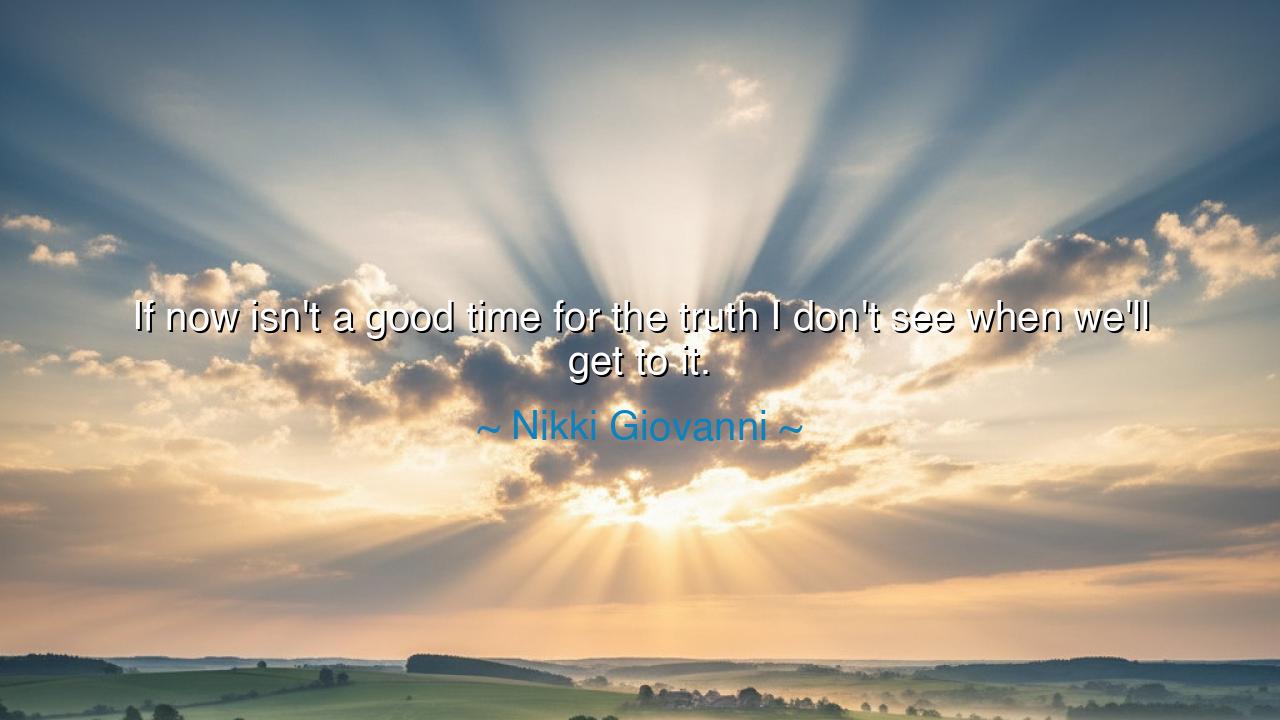
If now isn't a good time for the truth I don't see when we'll






The words of Nikki Giovanni, “If now isn’t a good time for the truth I don’t see when we’ll get to it,” ring like a bell calling us back to courage. They are not spoken as idle musings but as a command from one who has seen the urgency of justice, the fleeting nature of life, and the cost of silence. In this quote, Giovanni proclaims that there is no tomorrow for honesty, no later time more fitting for justice, no perfect season for truth. The only time that belongs to us is the present, and if we do not speak now, then when?
The origin of these words is rooted in Giovanni’s long life as a poet, activist, and voice of the Black Arts Movement. She lived through decades when voices were silenced, when the cries for equality and dignity were suppressed by those who preferred comfort over confrontation. Giovanni, however, used her poetry as a sword and a shield, speaking unflinchingly of race, love, freedom, and struggle. This line captures the essence of her philosophy: delay is the enemy of progress, and truth delayed is truth denied.
The ancients, too, knew this truth. The Hebrew prophet Amos thundered, “Let justice roll down like waters, and righteousness like a mighty stream.” He did not counsel waiting for a better season—he demanded it now. Likewise, Socrates, when brought before his judges, refused to delay the truth of his philosophy, though it cost him his life. Giovanni’s words echo this eternal cry: if we do not seize the present to speak truth, we gamble with a future that may never come.
History offers luminous examples. Consider Martin Luther King, Jr., who wrote from a Birmingham jail, answering those who counseled patience in the face of segregation. “Wait,” he said, had almost always meant “Never.” He knew, as Giovanni declared, that the only time for truth is now. To delay justice is to deny it, and to postpone truth is to strengthen lies. The civil rights movement triumphed not because it waited for perfect conditions, but because it refused to wait at all.
The meaning of Giovanni’s wisdom is clear: human beings often postpone honesty, telling themselves the right moment will come later—when it is safer, when others are ready, when we feel braver. Yet the right moment is always now, because life is short, and silence only deepens the wounds we fear to expose. To defer truth is to surrender to fear. To speak it, even imperfectly, is to open the door to freedom, healing, and transformation.
The lesson is this: never wait for the perfect time to speak what must be said. There is no “perfect” season for truth, for the world will always throw obstacles in its way. Speak now, act now, live now, for truth is the seed of change and silence the soil of decay. Even if your words tremble, let them be spoken; even if the world resists, let it hear them. The courage to speak truth in the present moment is what moves history forward.
Practical action lies close at hand. Begin with your own life—speak honestly in your relationships, in your work, in your community. Refuse to cover lies with silence or to defer integrity for convenience. If you see injustice, name it. If you see deception, expose it. If you feel love or gratitude, express it now, while there is still time. In this way, your life itself becomes a testimony that truth is never late, only spoken or unspoken.
Thus, in the voice of the ancients, we proclaim: Blessed are those who speak the truth in season and out of season, for they walk in courage. Blessed are those who refuse to wait, for they will see justice move. And let us remember the wisdom of Nikki Giovanni: that if now is not the time for truth, then there will never be a time—for truth belongs always, eternally, to now.






AAdministratorAdministrator
Welcome, honored guests. Please leave a comment, we will respond soon